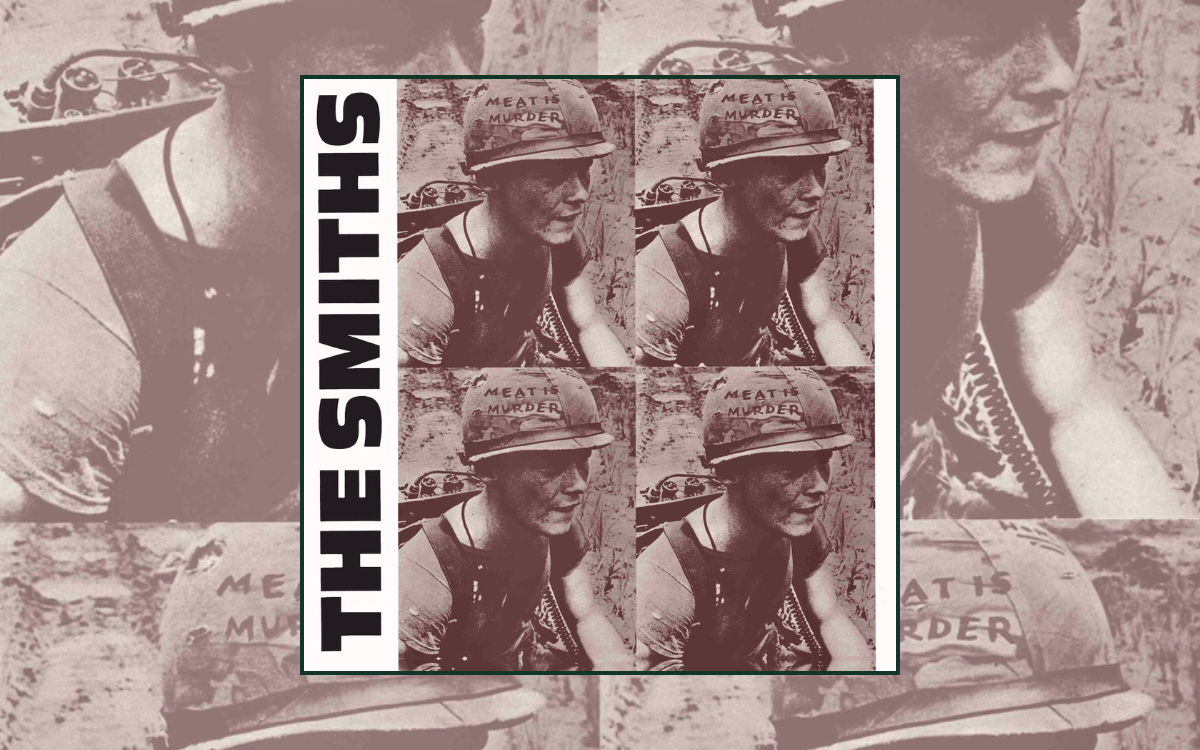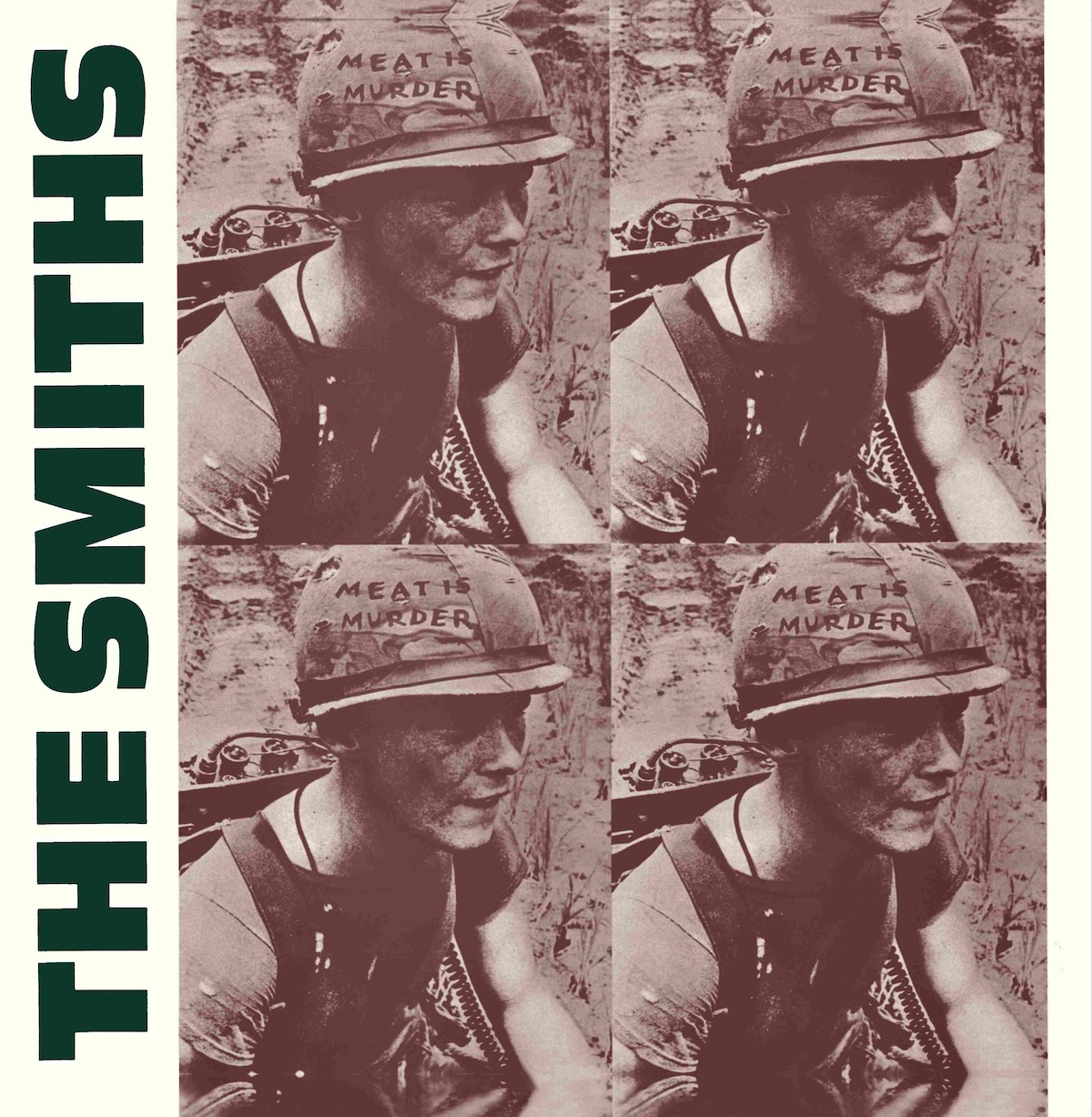The band take control to deliver a dynamic and diverse second album, which propels them to the top of the chart

After their troubled debut album, The Smiths were determined to take control to get their undiluted message out to the world and Meat Is Murder is where they coalesced into their purest, angriest vision.
Anyone who thinks that political music doesn’t change anything – and it’s a sentiment that’s taken hold in some quarters this century – needs only to be reminded of three words: Meat Is Murder.
At a time when vegetarianism was seen as “effeminate” – to quote a combative Morrissey in Smash Hits during its release – The Smiths’ second album literally changed lives. Johnny Marr, who became a vegetarian during the LP’s recording – is proud how The Smiths’ statement opened so many fans’ minds to the treatment of animals.
Thom Yorke was one of those inspired by the album. In vegetarianism documentary Eat This, he said of his reasons for cutting out meat: “The first thing was Meat Is Murder, The Smiths.” In the Rough Trade history Document And Witness by Neil Taylor, Marr said: “I’m very proud of the fact people tell me they became vegetarian as a result of Meat Is Murder. I think that is quite literally rock music changing people’s lives. It’s certainly changing the lives of animals. It’s one of the things I’m most proud of.”
Complete Control
The debates around the production of The Smiths’ self-titled debut mean the band weren’t under as much difficult second album pressure as they could have been. Instead, people hoped The Smiths’ follow-up would be the record to fulfil the promise of their magnificent live shows. Those concerts were An Event almost every time. So too were the songs they were unveiling, the Morrissey/Marr axis having reached its apex and showing no signs whatsoever of easing off: there was certainly no need for The Smiths to do anything so vulgar as bulking out their albums by previewing it with any singles.
Albums were one thing, singles another and why couldn’t more bands see this? How Soon Is Now? was added to the US release of Meat Is Murder, yet it’s been absent from its tracklisting Stateside too since the album’s reissue in 2011.
So confident were the songwriters in their talents, they took over production too, albeit crediting the whole band as producers. On the technical side, they enlisted Stephen Street as engineer, having been impressed with him while working on Heaven Knows I’m Miserable Now. Considering Street’s post-Smiths career – Blur, The Cranberries, Kaiser Chiefs – Morrissey and Marr could have added “Producer talent-spotting” to their CV too.
“We saw things clearer,” Morrissey told Melody Maker of the decision to take production in-house. “The only answer to the problems of the first album was to produce it ourselves and have control to the last detail, which didn’t necessarily happen with the first LP. Without a producer, things were better.”
Social Commentary
Of the nine songs on Meat Is Murder, its title track is probably its weakest, on a musical basis. It’s one of the few Smiths songs to sound as histrionic as their detractors claim, a pantomimic clang matched by Morrissey aiming for passion, rather than naturally inhabiting it as he does for the rest of The Smiths’ output. Placing Meat Is Murder at the end of the album obviously made a statement about the song’s importance, but it also made it easy to skip.
Other songs could have fitted the album’s mood more adroitly as a title track. Barbarism Begins At Home, complete with Andy Rourke’s appropriately brutal funk bass, remains as prescient as Meat Is Murder in its commentary against corporal punishment, the year before it was outlawed in schools. Although Marr has called the song “corny” and unrepresentative of The Smiths’ canon, Barbarism Begins At Home feels more evocative an album title than the on-the-nose Meat Is Murder.
What She Said would have neatly summarised the band’s nostalgic humour as an alternative, too. But, of course, The Smiths promptly followed Meat Is Murder with The Queen Is Dead. In an era when they were off to one side among so much hyperreal colour, they needed to keep their statements simple.
Looking back at Morrissey’s Smash Hits interview, it’s instructive to be reminded of just how suspicious the media still were about vegetarianism. Morrissey’s inquisitor is the great Tom Hibbert, but even Hibbert makes the standard trite joke of “Wouldn’t a good McDonald’s quarter-pounder put you back on your feet in no time?” when Morrissey arrives at the interview looking poorly.
Friendly Fire
In fairness, Morrissey seems to genuinely enjoy the sparring, explaining he had stopped eating meat a decade before, despite “a moderate bacon fetish.” His explanation for the necessity of The Smiths’ sloganeering is revealing, as Morrissey despairs of what he viewed as the timid attitude of other vegetarian musicians such as Paul McCartney and Limahl, saying: “They’re very effete, non-political figures who would never raise their voices, which is pointless. There’s no point in demonstrating if you don’t get any national press.”
The whole of the feature is given over to Morrissey’s thoughts on vegetarianism but, to Morrissey’s rationale of needing to give the cause some publicity, the band got their main point across. Not everyone involved with the album was so happy to become a flagship against meat. Corporal Michael Wynn, the US Marine pictured on the album sleeve, wasn’t consulted over his photo being used, nor the slogan on his helmet being changed to “Meat is murder” from “Make war not love”.
In 2019, Wynn – whose photo was originally used to promote director Emile de Antonio’s 1968 Vietnam War documentary In The Year Of The Pig – wrote on a Vietnam veterans’ forum: “I first learned of it when my sister happened to see the album while she was shopping. I wasn’t real happy about The Smiths changing the wording.” The Smiths considered Wynn to be the victim of friendly fire. As Morrissey told Melody Maker: “As the image of the LP hopefully demonstrates, the only way we can get rid of such things as the meat industry and nuclear weapons is by really giving people a taste of their own medicine.”
In taking on the production, The Smiths made their toughest album. It’s hardly metal, but Meat Is Murder is certainly a tauter, more menacing album than its predecessor. It’s aged so well 40 years on partly because The Smiths not only avoid any 80s production pitfalls but through perfectly capturing their anger.
Anger Is An Energy
It’s a simmering, intense mood, one that makes a nonsense of claims that Rourke and Joyce were dispensable. Few rhythm sections could have kept pace with the combination of Morrissey’s fire and Marr’s glittering playing. “It’s really important people realise we haven’t become sloppy,” Morrissey told Melody Maker of the album’s sound. “We didn’t want to go into the big league and adhere to all the rules. That makes the entire history of The Smiths pointless – there has to be something that separates us. In simple terms, we’re very, very angry: angry about the music industry, angry about pop music. It’s about time somebody said something and did something that’s of value.”
Doing something of value gave The Smiths their only British No.1 album, entering at the top spot in February 1985 before being replaced by Phil Collins’ No Jacket Required after a week: the same album would keep The Queen Is Dead from No.1 16 months later.
Morrissey remains rightly proud of the album and his bandmates’ work on album two, praising in Autobiography the “livewire spitfire guitar sound” of The Headmaster Ritual, Rourke’s “bass domination” in Rusholme Ruffians and Joyce’s “bruiser drums” of I Want The One I Can’t Have.
He is, naturally, most fervent about the title track, writing: “I relish to the point of tears this chance to give voice to the millions of beings butchered every single day.”
Something To Say
So, really, it’s probably churlish to cite Meat Is Murder’s title track as its musical low, when its impact was undeniable and the rest of the album was so aggressively on point. It’s remained shiveringly impactful at Morrissey’s solo shows, paired with slaughterhouse footage, while PETA paid tribute to the song in 2016 with the charity’s macabre video game This Beautiful Creature Must Die.
If an album can afford not to include classic contemporaneous singles as strong as How Soon Is Now? and Shakespeare’s Sister, before finally allowing an edited That Joke Isn’t Funny Anymore as a single five months later then you know you’re dealing with a special LP. True enough, The Smiths had only birthed What Difference Does It Make? too.
Their gigs remained imperious too. As Mike Joyce told this journalist recently of The Smiths’ prolific nature: “It’s hard to put into words how good the songwriting was. Every time I’d go to Johnny’s house, he’d play me a new tune he’d just written. It quickly became obvious I couldn’t say, ‘That’s the best song I’ve ever heard!’, because a day later he’d play me something else just as good or better.”
Everyone knows how good The Smiths were. Their songs have become such a screensaver of everyone’s lives, it’s easy to forget just how special they were. Meat Is Murder is probably the ultimate example. Go back to it now, and it hasn’t aged. It’s still vital, it still crackles, it’s still angry. And it’s still got something of value to say.

The Songs
The Headmaster Ritual
Causing Manchester Education Authority to try to ban The Smiths from playing the city – good luck with that – The Smiths opened Meat Is Murder with an already established live favourite. Its only TV performance was on BBC2’s The Oxford Road Show the week of the album’s release, and is utterly magnificent. It had the longest gestation of any Smiths song, taking three years for Johnny Marr to bring the music together from its original George Harrison-inspired riff.
Rusholme Ruffians
One of Morrissey’s more literal songs, Rusholme Ruffians is a maelstrom of teenage unrequited love and bullying. Morrissey went just once to a fair in Platt Fields, where he had his nose broken without warning. “I’m not obsessed with adolescence,” he insisted to Melody Maker. “It was something, as lots of people can probably gather, I didn’t cope with too cleverly. So I do feel bitterness.” Andy Rourke’s rampaging bass captures the mood perfectly.
I Want The One I Can’t Have
A more mature version of Rusholme Ruffians’ schoolboy tattoo yearnings, Morrissey’s love is still unrequited, as the object of his desire can’t or won’t come out. The line “A tough kid who sometimes swallows nails” is just perfect in depicting both the appearance of Morrissey’s crush and why their mentality hasn’t yet caught up with their biology. That it’s driven along by Marr’s galloping guitar, as close as The Smiths got to The Housemartins, beautifully distils the peril and restlessness of frustrated desire.
What She Said
A touching character study, Morrissey inhabits the persona of a young woman who quotes from Canadian poet Elizabeth Smart’s cult 1945 prose work By Grand Central Station I Sat Down And Wept. Smart’s own poem was inspired by a romance with fellow poet George Barker, but Morrissey’s story sees his heroine fall for a “tattooed boy from Birkenhead”. To make the song atypically meta, By Grand Central Station… was one of Morrissey’s own favourite books when he was a solitary teenager. Mike Joyce’s ferocious playing keeps the song from collapsing in on its own references.
That Joke Isn’t Funny Anymore
Although The Headmaster Ritual was a single in the Netherlands, That Joke Isn’t Funny Anymore was the only single from Meat Is Murder in the UK. You can tell The Smiths weren’t that taken with the idea by the fact it’s backed by live songs rather than a new B-side, with the 12″ featuring four tracks recorded at Oxford Apollo in March. Its original sleeve was to have carried on the album’s message, depicting a dead chicken, but this was eventually replaced with a still from 1964 Soviet fantasy film The Enchanted Desna chosen, according to Morrissey, because: “The eyes are encrusted with hurt and premature wisdom.”
Nowhere Fast
Originally planned as the follow-up single to William It Was Really Nothing, the rockabilly riot had to settle for inclusion on Meat Is Murder because Johnny Marr felt the band never quite nailed it in the studio. Marr is perhaps too harsh on himself, as it’s certainly single-worthy. Granted, you could say that about most of Meat Is Murder but, from Morrissey’s opening statement: “I’d like to drop my trousers to the world” it’s one of the great funny Smiths songs. A regular in the band’s sets, Morrissey has only returned to it solo for a handful of gigs, on the Years Of Refusal tour.
Well I Wonder
Even though it features on their only No.1 album, Well I Wonder is one of The Smiths’ most underrated ballads, so nakedly yearning that it’s possible the band never performed it live because it would have been too much for even Morrissey to have interpolated in concert. Although it’s unclear exactly what or who it’s about, the way Morrissey sings: “Please keep me in mind” and the raindrops pattering at the end are devastating. How Morrissey and Marr wrote this in their twenties grows more staggering every year.
Barbarism Begins At Home
A unique place in Smiths compositions, Barbarism Begins At Home is the band’s only song in which Mike Joyce follows Andy Rourke’s bassline for his drums’ cues, rather than Johnny Marr’s guitars. According to Joyce, The Smiths were similar to The Rolling Stones, as Charlie Watts was beholden more to Keith Richards than Bill Wyman. Joyce told NME recently: “Barbarism Begins At Home was just me and Andy playing in the room. My other drum parts were being attracted to Andy’s rhythm, then Andy would play a melodic bassline to sit on top.”
The artwork for the single release featured Viv Nicholson, the football pools winner who had previously appeared on the cover for Heaven Knows I’m Miserable Now.
Meat Is Murder
A theory that first gained traction in the 90s holds that Meat Is Murder was inspired by anarcho-punks Conflict, whose song Meat Means Murder predates The Smiths’ title by two years. It’s possible that Morrissey was inspired by Conflict’s title, but nothing else about the song suggests anything Smithsian. The singer was vocal in stating he believed in violent protest at the time, stating that animals needed direct action to help them if society wasn’t going to change necessarily quickly.
For more on The Smiths click here
Subscribe to Classic Pop magazine here
Classic Pop may earn commission from the links on this page, but we only feature products we think you will enjoy.


